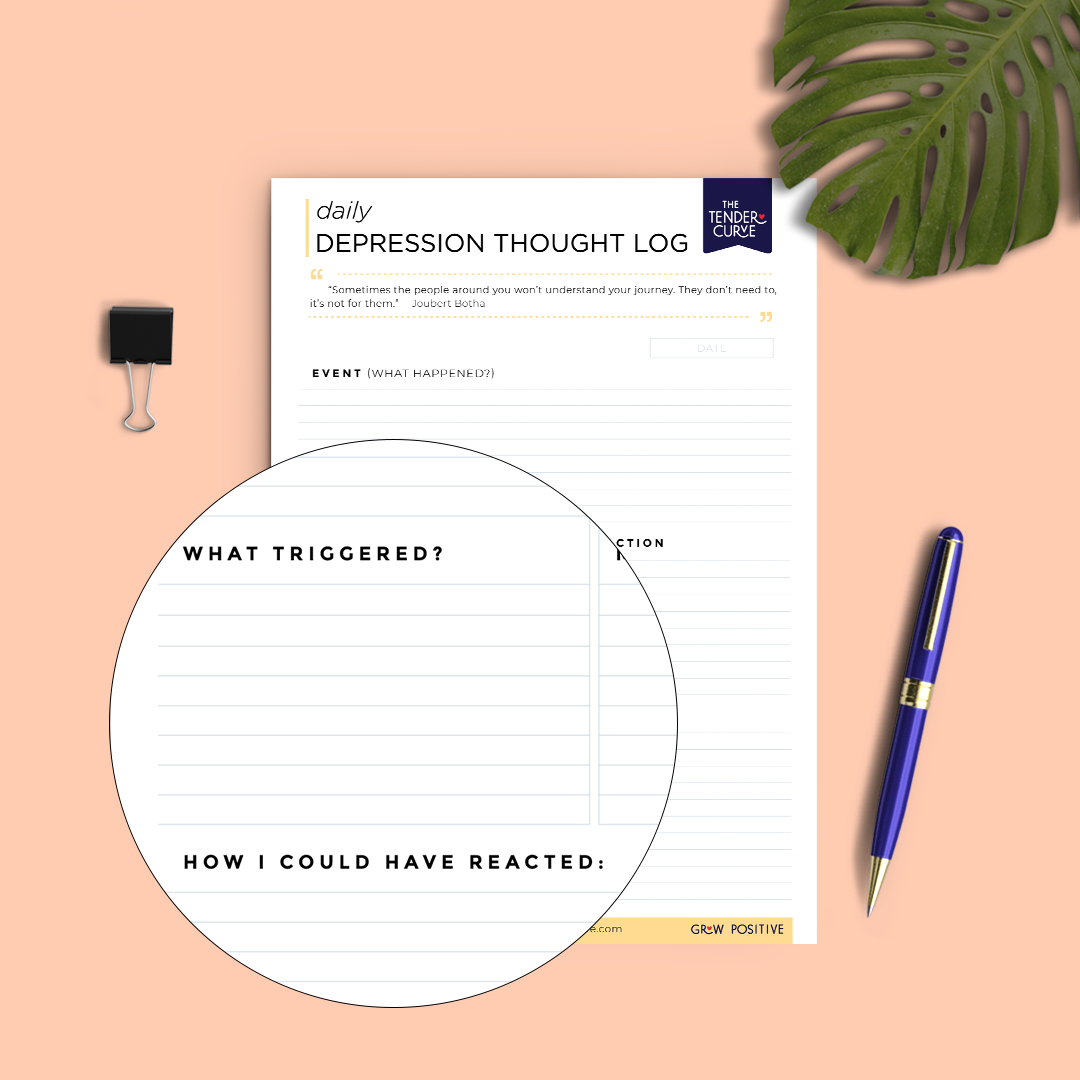Understanding Depression

WHAT IS DEPRESSION?
Depression is one of the most common mental illnesses seen globally. Depression can be classified as a mood disorder that causes loss of interest in daily activities, persistent sadness, and a feeling of worthlessness. It can be marked by the presence of frequent mood fluctuations and short-lived negative emotional responses. When these emotional responses and negative feelings start disrupting daily life to a point where it is unavoidable, it can be categorized as clinical depression. It is one of the leading causes of suicide amongst people.

HOW TO DIFFERENCIATE BETWEEN ‘FEELING’ DEPRESSED AND ‘HAVING’ DEPRESSION:
Sadness is one of the basic and most common emotions experienced by humans. However, “feeling” depressed and being “clinically” depressed is not the same. Sadness could arise when one goes through a negative situation and may resort to crying and feeling blue (sad). Depression on the other hand is a lot more.
Some of the main differences are:
| FEELING DEPRESSED | HAVING DEPRESSION |
| May feel sad | Have anxiety, feeling of worthlessness and guilt |
| Does maintain regular sleeping patterns | Has either insomnia (loss of sleep) hyper insomnia (sleeping too much) |
| Eats well and regularly | Can resort to over eating, or complete loss of appetite. |
| The feeling is short-lived | Constant feelings which are long lived and adjustable |
TYPES OF DEPRESSION:
Situational Depression
Situational depression is an adjustment disorder that is caused due to external situations such as loss of a loved one, end of a relationship, loss of a job, etc. It does have similar kinds of symptoms such as clinical depression, however; the intensity of emotions marks a difference where seasonal depression is more short-lived than clinical depression. It is a type of depression that comes and goes with the seasons, typically starting in the late fall and early winter and going away during the spring and summer.
Dysthymic Disorder (Dysthymia)
This mood disorder is categorised under unipolar disorder, in which a person experiences depression only. It can be explained with symptoms where the person goes through mild-moderate depression at least for two years. Another characteristic of this disorder is that the person may experience normal mood but the duration should not be for maximum 2 months. The person should come back to the depressive state, which is when it can be said that dysthymia occurs.
Major Depressive Disorder
Another disorder that falls under the category of unipolar disorder the person experiences a severe to intense form of depression. What makes this disorder different from the above category is the absence of symptom free / normal mood episodes.
Bipolar Disorder
Bipolar disorder is another type of mood disorder which marks the presence of both mania and depression. The person suffering from this disorder experiences regular episodes of elevated mood and having extreme emotions, known as mania followed by depression. There are two types of bipolar disorder – bipolar I and II. The types of bipolar disorder depend on the intensity of mania experienced while depressive episodes being constant.
Cyclothymia
This disorder is a milder version of bipolar disorder. The person experiences what is known as hypo-mania, which is a mild to moderate version of mania. Along with this, the person goes through mild to moderate form of depression. Due to the intensity of the symptoms this does not fit in the immediate category of bipolar disorders.


| Disorder | Category | Depression and intensity | Mania and intensity |
| Dysthymia | Unipolar disorder | Mild to moderate depression | Not present |
| Major depressive disorder | Unipolar disorder | Severe depression | Not present |
| Bipolar I | Bipolar | Severe/major depression | Full blown mania ( mania with very high intensity) |
| Bipolar II | bipolar | Severe / major depression | Hypo mania ( mania with low intensity) |
| Cyclothymia ( lower intensity of bipolar disorder) | Lower intensity of bipolar disorder | Mild to moderate depression | Hypo mania ( mania with low intensity) |

SYMPTOMS OF DEPRESSION:
- Feeling of worthlessness and hopelessness
- Feeling of guilt and anxiety
- Trouble concentrating and focusing on daily activities
- Insomnia or sleeping too much
- Loss of appetite or over-eating
- Irritability and aggressiveness
- Isolation from family and social settings
- Loss of pleasure in any activity
- Fatigue and extreme physical tiredness
- Suicidal attempts
CAUSES OF DEPRESSION:
Genetics:
One of the major causes can be recorded in a family history of the illness. Parents or immediate relatives with a history of depression can be passed down through generations.
Gender:
Gender can be a cause of depression which is also associated with certain life-events. However, women are more likely to suffer from the disorder than men. An example of this could be post-partum blues, which in fact is not depression but a shift in mood due to childbirth and hormonal changes. If not looked into, this could be a leading cause.
Personal circumstances:
Although many people face similar kinds of problems, each one has a different way to act and behave and take in the consequences of those problems. Abuse, trauma, are some of the personal circumstances that could result in depression due to differences in personalities and traits.
Personality:
There are many different personality traits that are at high risk of depression. The most common of them all is Neuroticism, which is a trait in which a person’s life is dominated with pessimistic thinking. Such traits are prone to be attacked by the disorder although it is subjective in nature.
TREATMENTS TO DEPRESSION:
Depression, like any other clinically recognised mental disorder needs professional assistance as one cannot treat themselves due to the biological and hormonal changes that take place in the brain. Professional help that is looked at for treating depression are as follows.

Medication through anti-depressants:
Medical professionals such as psychiatrist resort to medications by prescribing anti-depressants to control the bio-chemical changes that take place in depression. An easy way to explain this is anti-depressants reduce the imbalance in neurotransmitters such as dopamine, serotonin and norepinephrine that are responsible in increasing and generating depression in a person. Through proper medication can regulate the reduction and regulation of these neurotransmitters at work.
Psychological Therapy:
Therapy combined with medications can prove to be useful in different ways; such as Cognitive Behavioural Therapy, talk therapy etc can provide an extra dose of treatment for the mind. This not only helps people understand themselves, their irrational thoughts from within, but also automatically affects the way they function which will have a natural effect on the brain. Thus regulating their hormonal, cognitive, and behavioural balance.
Other treatments:
Other treatments can be guided and non-guided and can be done by the person themselves. Exercising, running or even guided meditation can be one way to keep the mind and body intact.
Conducting daily activities can be a tough job if the depression is severe. Starting off by a daily affirmation board prepared by a family member or even a therapist can help the person move their body and channelize their thoughts.
Other activities such as journaling can allow the person to track their mood, sleep and thoughts by recording them daily. A combined effort of all these treatments can prove to be helpful.
*DISCLAIMER*
The following content is for information purposes only. We, in no way claim or assure that using the information can be a substitute for any kind of medical treatment if any. If you are diagnosed with any kind of medical/clinical condition please do not avoid visiting a professional.
ABOUT THE TENDER CURVE:
Our purpose is to spread positivity and motivation by focusing on self-love and self-care. We also work towards reducing the stigma around mental health and by creating mental health awareness through our blogs.
People today have forgotten how to be happy; they have forgotten what it is to be inspired what it to be real & motivated. We all are so busy with our daily lives today that we have forgotten to take time out for ourselves. We are here to remind you that you are special in your own ways. We are here to remind you that it’s okay to not finish a task, or meet deadlines, its ok not to be ok! You deserve to be happy, you deserve to smile, you deserve to be cared and loved.
FREE DOWNLOADS
Related Blog Posts
Understanding Loneliness – What, When And How
Loneliness - The Defining LineLoneliness can be defined on the lines of the discrepancy or the inability to achieve the desired social support. Loneliness is very subjective, and it need not necessarily be seen when we meet or talk to a person. Today, the world that...
Understanding Gratitude – Counting Your Blessings, Nurturing Your Mind
Gratitude is the act of being thankful, being appreciative of anything that pleases you. Gratitude is a spontaneous feeling; however, the practice of gratitude is consciously allowing yourself to count the blessings you have. In simple words, gratitude is a positive...






0 Comments